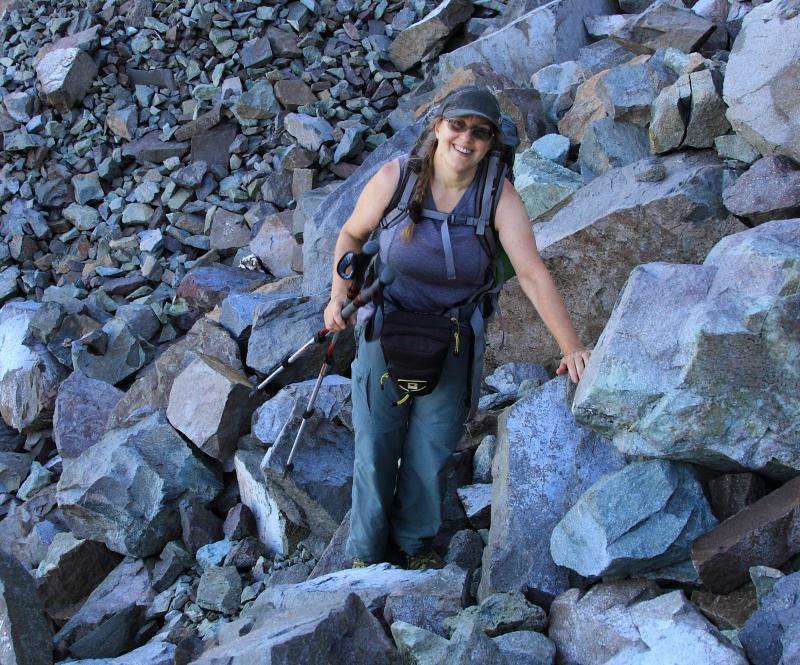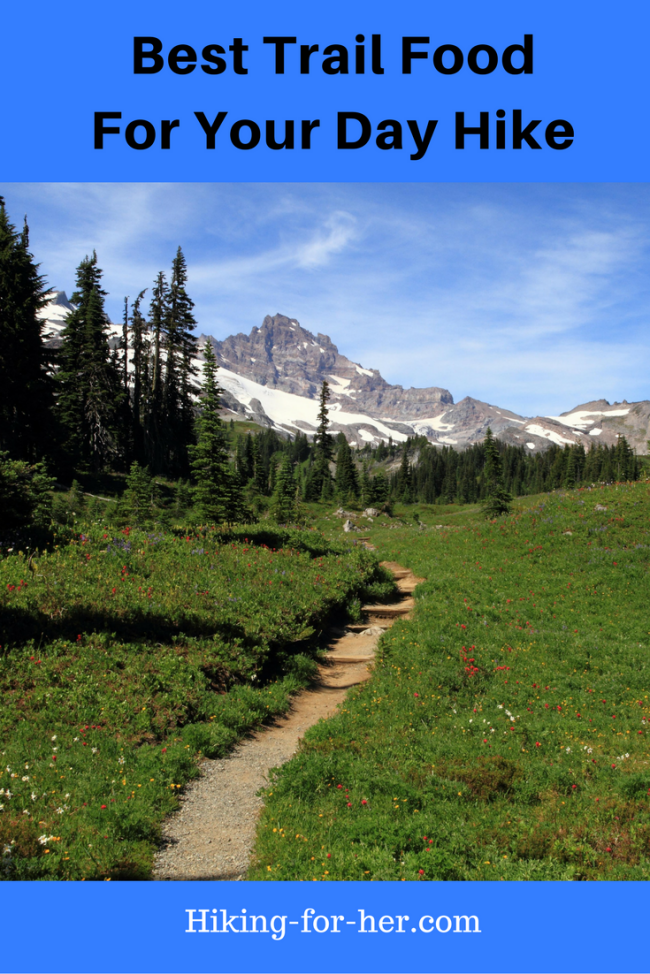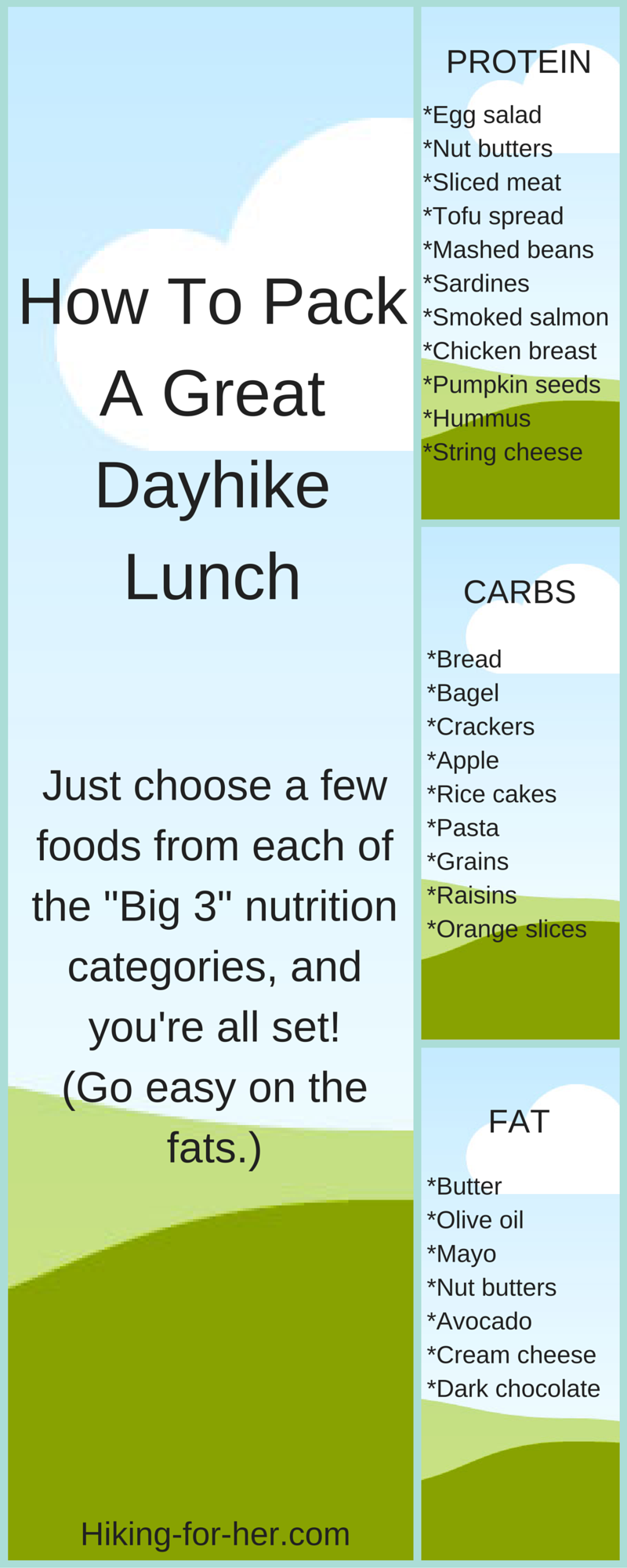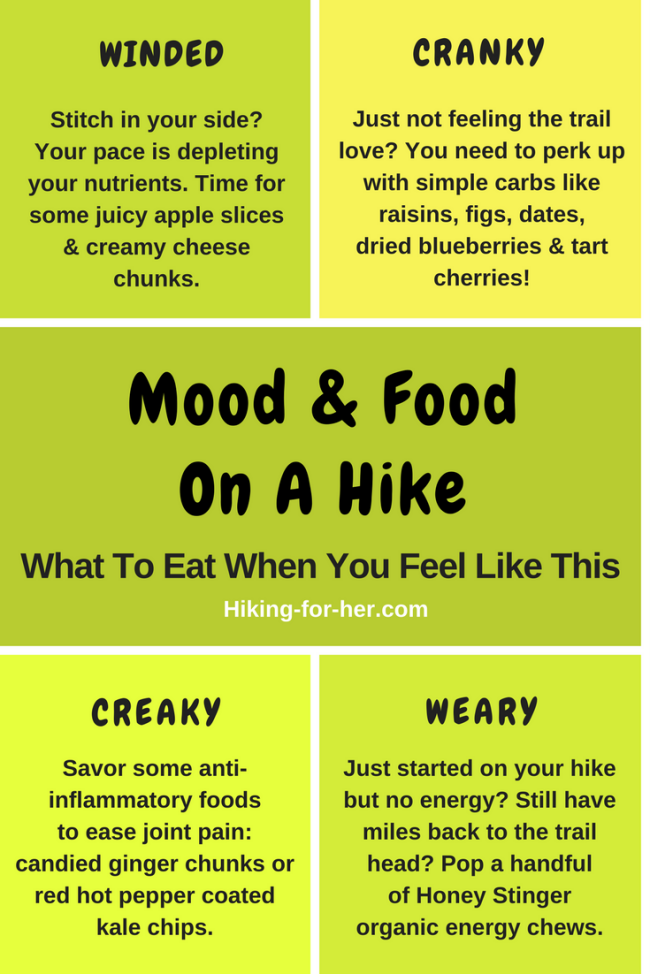Best Dayhike Foods:
Great Ideas
To Make Your Day
By Diane Spicer
Best dayhike foods?
You're kidding, right?
Quickly throw a granola bar and a water bottle into a pack, and you're done!
Uh, maybe?
Sure, you can get by with eating starving like that on a day hike.
But why just "get by", when you can have abundant energy and stamina by eating the right day hiking foods?
And just so you know, not all granola bars and trail snacks are created equal.
- Cheap hiking food brands at the grocery store may work against you on the trail.
Please allow me to share my favorite day hike snacks with you!
Hiking For Her is an Amazon affiliate. When you purchase your hiking food through this website, a small percentage of your price is received by HFH
But you pay nothing extra.
These choices make good nutritional sense, and keep you fueled up with steady energy hour after hour.
- If you're in a hurry, here's an alphabetical list of great day hike nutrition tips! You don't want to miss out on any tasty treats :)
Or hop further down the page for tasty dayhike food suggestions for lunch that aren't dependent upon trail bars.
Best backpacking food, too?
You can use these hiking food suggestions for snacks on your backpacking trip, for all the good reasons mentioned.
They're lightweight, nutritious, tasty, and can fit a wide variety of hiking budgets.
Or read about my specific suggestions for backpacking food.
Now let's get to the details about the best day hike foods.
Favorite dayhike foods:
trail (energy) bars
Not the "cocktails" kind of bars!
- That comes later, when you're celebrating your energy filled hike.
I'm referring to the hiking snacks that keep me going between meals during a day hike, in all kinds of weather.
And just so you know:
To be on the sanctioned Hiking For Her list of favorite dayhike foods, they have got to be delicious & nutritious.
They must pass close scrutiny of their ingredients (no fillers, artificial dyes or colors, or cheap corn syrup).
Another thing I look for is the ability to buy these in bulk. If you purchase them one at a time, the price adds up fast.
- So if I can get a good deal on a case of them, I toss some into the freezer and use up the rest in a short amount of time (a month or so; check expiration dates).
I need to be gluten free, so that's also a strict part of the criteria for a great trail bar.
If you want to go organic, here are some tips.
With all that in "scrutiny" in mind, let's take a glance at my current favorite day hike food in the form of trail bars (also known as a partial answer to best hiking food for dayhikers and backpackers).
- These convenient bars can be a delicious choice at work, after a daily walk, or while commuting if you're looking for healthy hiking snacks that do double duty.
Lara Bars
in a galaxy of flavors
Lara Bars have been around for awhile.
When they first came out I was overjoyed by how short the ingredient list was - and how much flavor they packed.
These bars rely upon nuts, so if you're nut intolerant (I will skip the easy joke here, and you're welcome) these are not for you.
The variety of flavors is mind boggling.
My current favorite is Cashew Cookie, but I have been known to buy a case of mixed flavors to keep my taste buds from dozing off:

ZING bars
ZING bars were designed by nutritionists who paid attention to nutrient ratios, but also got the taste right.
These bars don't get rock hard in your pack overnight, and they don't melt in the heat.
- The same could be said of Lara Bars - but those will get smooshed if you subject them to high pressures like sitting on your pack.
I love the blueberry flavor, but truthfully, I have yet to meet one I don't like!
The chocolate coconut bar really hits the spot sometimes but for some reason I keep gravitating back to blueberry.
These can be quite expensive if purchased one at a time, so consider the bulk buy option and split some with trail buddies:
KIND bars
for your sweet tooth
Kind bars are a bit on the sweet side, but if I need lots of glucose in my bloodstream to tackle some elevation gain, I enjoy munching on one of these.
If you like savory and sweet combined, you should try these for sure.
Caveman bars
My apologies for the name of this one: Caveman Bars.
- This is, after all, a woman's hiking site!
However, I'm willing to overlook the name and focus on their taste.
Why?
Because I was introduced to these bars on a back country trip through ANWR (Arctic National Wildlife Refuge), and they kept me fueled through 10 days of rugged terrain and temperature extremes.
I kept looking forward to rest breaks so I could eat another one!
Remember the Hiking For Her calorie rule:
Calories don't count when you're working hard,
so don't count them!
 |
Favorite flavor? I couldn't decide! All of them are quite tasty and filling. The descriptive names will help you navigate away from nuts, if necessary. |
GoMacro bars
GoMacro Bars are toothsome and satisfying, and the ingredients are a dream for hikers who scrutinize food labels:
no additives or preservatives, USDA organic, and can easily fit into your dietary restrictions, including
- gluten free
- macrobiotic
- vegan*
*The glucose is derived from 100% brown rice, making it a grain based source of carbohydrates.
|
Lots of flavors to tempt you, too! Check out the mini bar variety pack, and stash some in your car, gym bag, and purse for emergency snacking. |
 |
Now let's go beyond trail bars
for the best dayhike foods
to eat for lunch
Here's the truth, dear hiker:
The key to great hiking energy is a bit more complicated than chomping on the best trail bars.
Your body requires a steady supply of carbohydrates, fats and proteins throughout the day in order to keep you chugging along on the trail during a day hike.
Some of this cellular fuel comes from the stored glycogen (sugars in skeletal muscles, liver) and adipose (fat) from what you've eaten in the past.
But most of it comes from what you eat the day of your hike.
- So an energy bar and a few sips of water is a good start, but not nearly good enough to make your day.
Which day hike foods can deliver a good balance of fuel while you glide down the trail?
Ah! Glad you asked!
- The best hiking snacks give you energy all day long.
For the nitty gritty answers about dayhike foods as fuel, read this.
For a brief overview and some ideas for choosing the best hiking food, stick with me here for a bit.
- Because your mood and your food on the trail are related.
Carbohydrates:
why they are ideal dayhike foods
Let's start with carbohydrates as an important nutrient to include in dayhike foods.
In fact, they're the most important of the "big 3" nutrients mentioned above! You'll see why in a moment.
Carbohydrates are sugars, either "simple" or "complex".
Simple sugars will flood your bloodstream with glucose ("Whoa! Burst of energy!"), then leave you to crash and burn ("Whoa! I gotta sit down").
Candy bars and sugary/caffeinated drinks are notorious for that quick hit of energy, but you should avoid relying on them for sustained energy on the trail.
An exception would be a candy bar with lots of nuts (sources of fat/protein), which can slow down the release of the sugar and provide a more sustained, even release of nutrients.
I hear that Snickers are favorite dayhike food for thruhikers, those dedicated hikers who specialize in serial day hikes along the Appalachian, Pacific Crest, Superior or Wonderland Trails every summer.
Candy bar drama: just say no
Of course, a candy bar presents other issues:
- Will it melt (if chocolate coated)?
- Is it packaged in layers of wrapping that you have to keep track of?
- Will it crumble to dust in your pack?
- Will it give you indigestion if you wolf it down?
- Can your pancreas handle the sudden rise in blood sugar followed by the crash?
Those simple sugars are high maintenance items!
I just skip all of the drama...
with one notable exception: I suck on hard candy when I have to work hard on steep uphill sections of the trail.
Favorite trail candies
make delicious hiking snacks
My day packs have crafty little zippered pockets within easy reach on the hip belt and shoulder straps, and I stash my favorite candy there.
Each season I tempt myself with a new flavor.
Why?
These little flavor bombs keep my mouth hydrated (the saliva reflex), and take my mind off the hard work at hand.
And because the sugar is released quickly and steadily, it fuels my skeletal muscles and keeps my brain alert.
Heads up: If you're sensitive or politically opposed to corn syrup, be careful about buying cheap bags of candy because the cheaper it is, the more likely it is there's high fructose corn syrup in it.
Read the labels!
And know that there are dozens of words for sugar.
Here are two of my favorite trail candies with no corn syrup.
 |
The first one tastes like caramel with some extra flavor pops: espresso and gingerbread. Not super hard, and will get softer if kept in your pocket. |
The second one fills your mouth with fruity (organic) goodness, so stock up and stash a tin in each of your packs!

Sustained energy: the holy grail
of great dayhike foods
For all other trail work, the goal is slow and sustained energy release.
That's where complex carbohydrates from grains or fruit, plus a dash of protein, come into the picture - and your lunch sack - as appropriate dayhike foods.
If you'd like details on how to calculate your exact nutrition needs as a dayhiker, I recommend my e-booklet on this very subject, which you can pick up here.
I created it based on the questions dayhikers were asking about what to eat on the trail.
If you're serious about good trail performance as a dayhiker, the information in these booklets will get you pointed in the right direction (so to speak).
How often to snack on these carbs?
Great question!
Some dayhikers like to stop every hour to snack on handfuls of trail mix or gorp, or to gulp down an energy bar (see above for recommendations).
These hiking snacks, in the category of very best hiking food, try to deliver all 3 types of fuel at a sustained rate into the bloodstream:
- carbs from rice or wheat or dried fruit,
- fats, and
- proteins from nuts or nutrient isolates (soy, for instance).
Unfortunately, stopping often to eat may work against you.
Your skeletal muscles will slow you down as your body tries to digest the frequent food because your blood is being diverted from legs and arms to your gastrointestinal tract.
For
that reason, I prefer to rely on my stored glycogen and fat for the
first 3 hours of a day hike, then stop for a snack when I receive strong
hunger signals.
Caveat: This depends upon what I had for breakfast, the type of terrain, and the temperature, too.
That gnawing hunger sensation after a few hours forces me to break out a handful of trail mix or an energy bar, along with plenty of water to wash it all down.
This isn't just a matter of getting the peanut butter off the roof of my mouth.
No, it's a cellular energy insurance policy!
- Water is a solvent, and if you don't have enough of it in your body, your energy levels will suffer.
My best trail tip is to snack on raw nuts and dried fruits, especially if you haven't found an energy bar you really like yet.
Hiking snack ideas to try
My favorite source for fruit and nut mixes as trail snacks is Trader Joes.
Here are a few suggestions of trail mix to try for this important category of dayhike foods.
These handy packs can easily be repackaged into trail sized bags.
Just go easy on them.
A handful, chewed thoughtfully as you check the map for your next benchmark, will do the trick.
Tip:
Keep nuts in the freezer until you hit the trail - their oils won't go rancid on you if you can't get out for a hike as often as you'd like.
And you can always use them in your baking projects, right?
Or create your own trail mix
to match your hike
Not every hike needs the same amount or type of fuel i.e. hiking snacks.
Read this to match your trail mix to your hike.
Protein and fats in dayhike foods:
don't skip these!
Protein and fat, as already mentioned, can be obtained via nuts or nut butters.
- The best nuts for healthy hiking are discussed here.
- The best protein sources for hikers are covered here.
NOTE:
Be sure to purchase high quality nuts. If they've been sitting around for awhile, the fats become rancid (see storage tip above).
Sometimes you'll notice the "off" flavor, but not always.
Your body has a harder time processing rancid fats, and they make weaker cell membranes.
Avoid rancid nuts at all costs.
That means pay a bit more for high quality, properly stored nuts!
- Because sometimes a bargain can be a costly mistake in terms of the best dayhike foods.
You can be a jerky fan
Another great source of protein is jerky (dried meat).
But beware! Not all jerky is created equal.
Some jerkies are chock full of preservatives and strong flavorings.
Tip: Buy a small package and give it a taste test at home before committing to an expensive large pouch for a hike.
I love buffalo jerky because it seems to "burn clean" (no digestive upsets, no weird tastes, no burping) ... an important consideration for choosing your dayhike foods.
I found a particularly flavorful and "clean" buffalo jerky because of a trail recommendation (Yes, I've been known to stop total strangers and ask about something, and this time it was along the lines of "Hmm, what's that? It looks good!").
Here's the product: Tanka buffalo and cranberry bites.
A bit pricey, yes, but geez it's great as trail fuel!

I have to pace myself because I tend to gobble it down.
- The cranberries add a moist deliciousness that is amazing to experience.
Thankfully, this package lasts for several hikes.
Another fine jerky choice for hikes comes from Patagonia Provisions.
- This bison jerky is carefully sourced and prepared to deliver optimum (and tasty) nutrition in a backpack friendly resealable package
Sneak some protein
into a smoothie!
Hydro Flask makes sturdy double walled insulated metal bottles, keeping your smoothie at the correct temperature and safe to drink as you drive.
Read my review if you need the specs.
A recovery smoothie post-hike makes sense, too.
Tip:
Store your smoothie in a cooler and have it waiting for you after your day hike.
- Hydro Flask makes a special lid with a straw for just this purpose!
Pack some protein in your
day hike lunches
When I finally stop for lunch, I make sure my slices of bread (complex carbs) have protein and fat between them, in generous amounts.
On hiking days I don't worry about calories, because I know that if I'm out for even just a few hours I'll be running a calorie deficit.
Some days, if I'm working hard on the trail, I even have Second Lunch (ten million hobbits cannot be wrong)!
Delicious protein rich
sandwiches for delicious
dayhike foods
Anything I eat on the trail as day hike foods will be a great combination of flavor and nutrients, backed up with good quality ingredients.
I'm working hard, so I want to really enjoy my food.
Tip: If you're used to racing through lunch, dial into your surroundings and mindfully consume your sandwich slowly. your food will taste so delicious!
Try some of my favorite day hike food combos:
- peanut butter and banana
- almond butter and strawberry fruit spread
- tofu "egg salad" - extra spicy! with lettuce
- chicken and mayo
- cheese, greens & mustard
- tuna & avocado
You can find lots more tips for the best protein sources for your hiking lunch here.
A few sandwich trail tips
for day hike lunches
Wrap up your sandwich in a sheet of non-reactive reusable bees wax - a great alternative to plastic bags.
Or this handy 3-pack: small, medium and large wrapping options!
Hiking in warm weather?
- Be sure to read my tips for day hike food safety here.
Clean fuel is best
for your hiking body
I strive to avoid preservatives and artificial ingredients because they keep my liver & kidneys distracted from their important tasks: pulling nutrients from my bloodstream and dumping waste products from my body.
Also, I don't want my taste buds to become used to fake flavorings, lots of salt and sugar, or intense flavor combinations.
- Why miss out on savoring the subtle flavors in great dayhike foods!
Did you know that the American food supply contains over 3000 ingredients to boost flavor, extend shelf life, and create certain textures?
That's a lot of too many chemicals!!
I respect my hard working liver and kidneys too much to throw all of that at them - especially on the trail when they're already working hard to get the right balance of blood sugar and water.
Bottom line?
- I want to achieve my hiking objectives for years to come!
- And I know you do, too.
So make sure that only the best dayhike foods are part of that plan.
The ones recommended here fit squarely into that category! I want you to be a healthy, happy hiker :)
Now get out there
& start snacking!
This overview of the best dayhike foods should get you started snacking on the trail.
Be sure to share your dayhike foods with your trail buddies! They aren't picky about flavors :)
P.S. Just kidding
Don't train these camp robbers (gray jays) to eat human dayhike foods.
They're much better off with bird foods.
But I couldn't resist the glint in this one's eyes as the best dayhike foods came out of my backpack!
Dayhike Foods
Ready to try backpacking? Best backpacking food ideas

About the author
Diane is the founder of Hiking For Her.
She’s been on a hiking trail somewhere in the world for nearly five decades, & loves to share her best hiking tips right here.
Some of the links on Hiking For Her are affiliate links, meaning that your purchase generates a very modest amount of financial support to help HFH share the best hiking tips.
- It costs you nothing extra, by the way.
Your support is appreciated, and used to create even more hiking information to be shared freely with all of our virtual trail sisters (and brothers).
Thank you!
|
I get emails all the time about what I wear, eat, carry and love to use on the trail. That's
why I provide affiliate links to you: the best gear that I use myself and have seen used by other hikers is instantly
available for your consideration, and the gear company sends a few
pennies per dollar to this reader-supported hiking website. There is no added cost to you! Everyone ends up a winner: Great gear for you, strong gear companies, and more free hiking tips for everyone. Thanks very much for your support. It's warmly and sincerely appreciated. It also helps send these hiking tips to all your virtual trail buddies around the globe. |
 |












